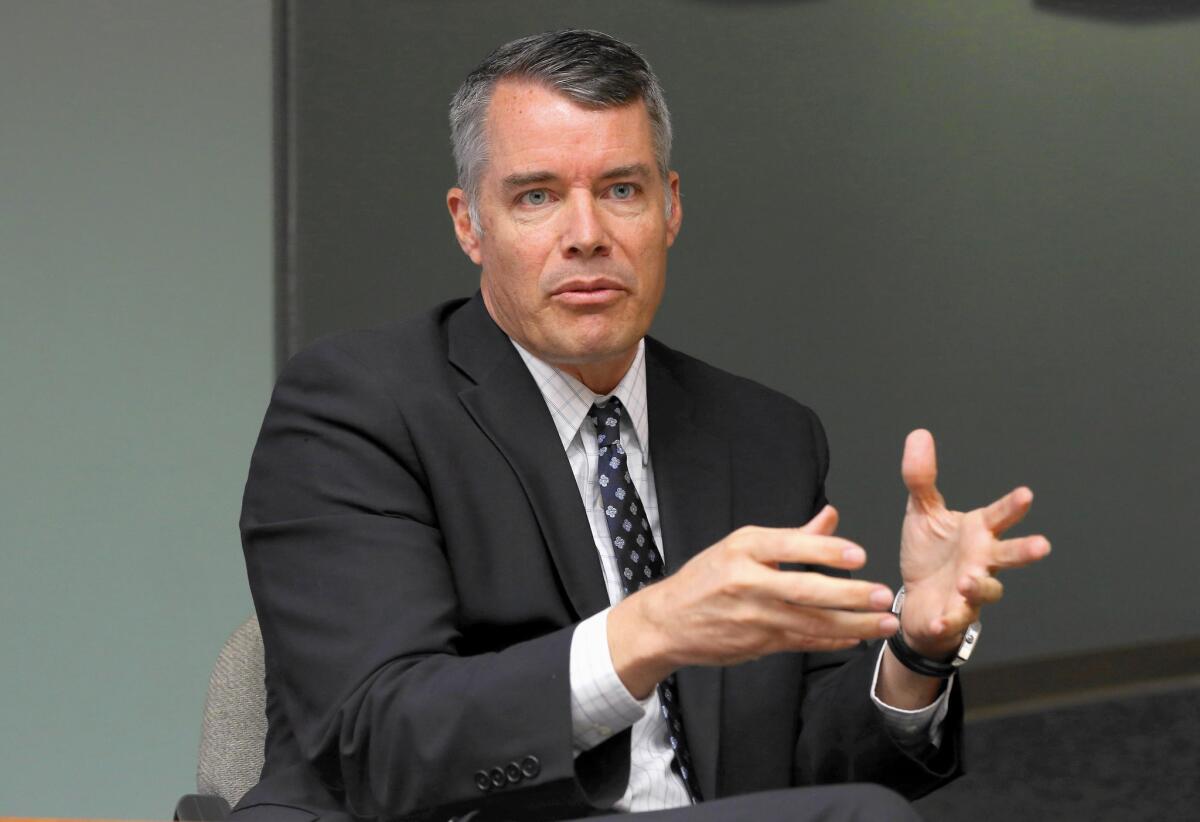California GOP survives, barely, to fight another day

- Share via
SACRAMENTO — When political neophyte Pete Peterson was thinking about running for California secretary of state, his mentor urged him on with surfer logic: “Sometimes you need to be the guy in the water when the wave hits.”
The mentor was former Secretary of State Bill Jones, a fellow Republican who himself caught a national GOP tidal wave to narrowly win the office 20 years ago.
Peterson, a Pepperdine University think tank director with a gorgeous daily view of the Malibu surf, was figuratively in the water Tuesday and caught a nice wave. But it wasn’t quite big enough to carry him to Sacramento. He lost to Democratic state Sen. Alex Padilla of Los Angeles by five percentage points, at last count.
Yet that’s a better performance than most experts had expected from the Republican, who was greatly outspent and barely had enough cash for a few radio ads.
The national GOP wave did ripple onto our blue state shores and provide a lift for Republican candidates. None won statewide office — again. But most races were a bit closer than expected, including Gov. Jerry Brown’s.
The Democrat won in a near-landslide with roughly 59% of the vote. But only a few weeks ago, prognosticators were projecting him to soar into the high 60s or even 70s. Still, his was the biggest gubernatorial win in California since Republican Gov. George Deukmejian was returned to office with 60.5% support in 1986.
California has turned left since then, threatening to run over Republicans and bury them. The national wave, however, had sufficient splash to revive the party here and allow it to survive until the next election, at least.
The GOP won enough legislative seats to deny Democrats another two-thirds majority — not a hugely significant achievement in practical terms, but important for morale and symbolism.
Especially encouraging for the minority party was the capture by two Asian American women — Janet Nguyen and Young Kim — of Orange County legislative seats. That’s changing the face of the party, something badly needed in this most demographically diverse state in the nation.
Other observations from the election:
• Brown’s reelection, even if by a smaller margin than expected, represented a truly remarkable feat historically.
Think about it: By the time Brown finishes his record fourth term in 2018, Democrats will have held the California governor’s office for only 33 of the previous 120 years. But in 24 of those 33 years, it will have been occupied by the Brown father-son team.
Uncharacteristically for Jerry Brown, 76, he seemed a bit humble election night talking to reporters in front of the historic governor’s mansion, last occupied for any length of time by his father Pat.
“It’s going to be quite challenging,” he said of the next four years. “I’m going to have to keep my foot on the brake while I slam on the accelerator.”
We’ll have to wait and see what that means.
He seemed to admit not putting much thought into a final term agenda. “So tomorrow,” he said, “I’ll be there figuring out ... what the hell you do in a fourth term.”
When a reporter mentioned that his Republican opponent, Neel Kashkari, had urged him to be bold, the governor replied: “Being here tonight is bold….
“I didn’t get here by being pusillanimous.” He added with a grin: “I just had to throw one of those words out.”
He promised to “avoid the mistakes” of his second term 36 years ago. He wouldn’t identify them. But running for president a second time was one.
• It’s tempting to pontificate about the meaning of those ballot initiative results. One could argue that voters were saying, “Don’t mess with my healthcare,” “We’ve gone too far locking up people,” “Keep those Indian casinos out of cities.” And there’s some truth in all that.
But what those results really were about were gobs of campaign money. The winners outspent the losing sides anywhere from 10 to 1 to 40 to 1. The medical profession and insurers forked out well over $100 million to beat Props. 45 and 46 with an unrelenting barrage of truth-challenged TV ads.
“Propositions are where money has the most influence in elections,” says former Common Cause official Derek Cressman, a secretary of state contender who didn’t survive the primary. “Candidates have party labels. Some voters don’t need much more information than that.”
It’s corrupting in any election when one side can drown out the other, he says.
“Imagine in court if one attorney was allowed 20 minutes for a closing argument and the other got just one minute. That’s what we have for ballot measures.”
What can be done about it? Very little, short of a U.S. constitutional amendment. And that’s not going to happen soon, if ever.
::
I reached Peterson on his cell Wednesday morning as he sipped some coffee, sitting with his wife and daughter at an outdoor cafe in Santa Monica.
Would he ever run for office again? “If someone called and told me, ‘I’ve got a great Senate district for you to run in,’ I’d tell them to shove off,” he said good-naturedly. Actually, he used a different word than “shove.”
“It’s still an ocean-view office back in Malibu,” he added. “No one needs to feel sorry for me.”
Peterson and Padilla ran one of the more positive, feel-good contests of the year.
Someone find that Republican a Senate seat.
More to Read
Sign up for Essential California
The most important California stories and recommendations in your inbox every morning.
You may occasionally receive promotional content from the Los Angeles Times.














